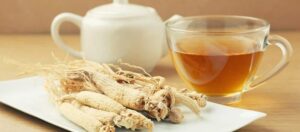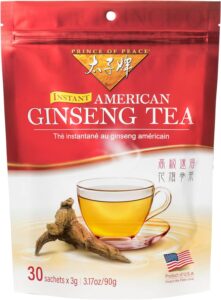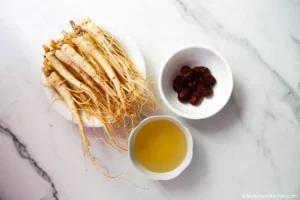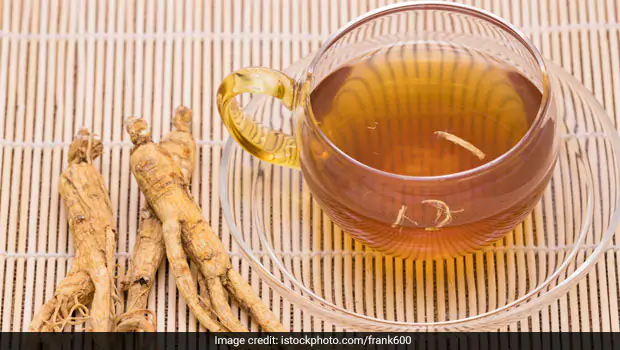Welcome, tea enthusiasts and wellness seekers, to your ultimate guide on Ginseng Tea. For centuries, this remarkable tea has been revered for its myriad health benefits and deep-rooted significance in various cultures around the world. From the mountainous regions of Asia to the bustling cities of the modern era, Ginseng Tea continues to be a symbol of vitality and healing. Let’s embark on a journey to uncover the essence of this powerful brew, its origins, and why it remains an integral part of holistic wellness practices today.
Table of Contents
Toggle- What is Ginseng Tea?
- The Health Benefits of Ginseng Tea
- How to Select the Right Type of Ginseng Tea
- Preparing Your Perfect Cup of Ginseng Tea
- When and How to Drink Ginseng Tea for Maximum Benefits
- Potential Side Effects and Precautions
- Ginseng Tea in Traditional and Modern Medicine
- Incorporating Ginseng Tea into Your Diet
- Myths vs. Facts: Debunking Common Misconceptions about Ginseng Tea
- FAQs: Everything You Wanted to Know About Ginseng Tea
- Where to Buy Ginseng Tea: A Shopper’s Guide
What is Ginseng Tea?

Ginseng Tea is not just any ordinary tea; it is a potent herbal drink made from the root of the ginseng plant. Known scientifically as Panax ginseng, this plant’s root is esteemed for its health-enhancing properties. The word “Panax” is derived from the Greek word for “all-healing,” underscoring the universal benefits attributed to ginseng. Ginseng Tea comes in several varieties, each with its unique properties and origins:
- Asian Ginseng (Panax ginseng): Also known as Korean ginseng, this variety is renowned for its energizing effects and is commonly used in East Asia.
- American Ginseng (Panax quinquefolius): Found in North America, it is valued for its cooling properties and is often used to promote respiratory health.
- Siberian Ginseng (Eleutherococcus senticosus): Although not a true ginseng, it is included for its adaptogenic properties, helping the body withstand physical and mental stress.
Culturally, Ginseng Tea has played a significant role across different regions. In traditional Chinese medicine, it is considered a powerful tonic that promotes longevity, enhances physical performance, and stimulates mental alertness. In the West, it has gained popularity for its potential to boost immunity and overall well-being.
The Health Benefits of Ginseng Tea
Delving into the myriad health benefits of Ginseng Tea, it’s clear why this ancient remedy continues to be celebrated in modern wellness circles. Each sip brings a wealth of positive effects on both mind and body. Here are the key health benefits that have garnered Ginseng Tea its esteemed reputation:
- Immune Boosting Effects: Ginseng Tea is packed with antioxidants and vitamins that help strengthen the immune system, making it better at warding off infections and diseases.
- Mental Clarity and Energy: Regular consumption can enhance cognitive functions, leading to improved memory, focus, and a natural energy boost, helping you tackle your day with vigor.
- Antioxidant Power: Its potent antioxidant properties aid in neutralizing harmful free radicals, contributing to overall health and potentially reducing the risk of chronic diseases.
- Heart Health: Ginseng Tea has been linked to improved cardiovascular health by regulating blood pressure and reducing cholesterol levels, thereby preventing heart-related conditions.
- Sexual Health and Libido: Known for its aphrodisiac properties, it can improve sexual health by increasing libido and combating erectile dysfunction in men.
- Hair and Skin Benefits: The antioxidants and vitamins in Ginseng Tea also contribute to healthier skin and hair, promoting a natural glow and reducing hair loss.
These benefits underscore Ginseng Tea’s role as a versatile and powerful herbal remedy. Its ability to promote overall wellness while addressing specific health concerns makes it a valued addition to any daily routine.
How to Select the Right Type of Ginseng Tea
Choosing the correct type of Ginseng Tea can be akin to selecting a fine wine – there are nuances and variations that can significantly affect your experience and the benefits you derive. To help you make an educated decision, consider the following:
Understanding the Differences
- Asian Ginseng: Best for those seeking a boost in energy and mental alertness. Ideal for consumption in the morning or early afternoon.
- American Ginseng: Preferred for its calming effects, it’s suited for reducing stress and enhancing relaxation. Great for evening consumption.
- Siberian Ginseng: Not a true ginseng but offers excellent adaptogenic benefits, helping the body adapt to stress and exertion.
Organic vs. Non-Organic
- Organic Ginseng Tea: Free from pesticides and chemicals, offering a purer form of the herb’s benefits.
- Non-Organic Ginseng Tea: May be more readily available and cost-effective but could contain chemical residues.
Product Recommendations

When looking for Ginseng Tea, consider brands that prioritize quality and sustainability. Look for certifications like USDA Organic or Fair Trade to ensure you’re getting a product that’s not only good for you but also for the planet. Here are a few recommended steps to ensure you’re choosing the best Ginseng Tea:
- Research the brand’s reputation: Look for reviews and testimonials about the brand’s quality and ethical practices.
- Check the sourcing: Ensure the ginseng is sourced from reputable farms or wild-crafted sustainably.
- Verify authenticity: Particularly with Asian ginseng, confirm that you’re buying genuine Panax ginseng.
Selecting the right Ginseng Tea is crucial to enjoying its full spectrum of benefits tailored to your personal health goals and preferences.
Preparing Your Perfect Cup of Ginseng Tea
Crafting the perfect cup of Ginseng Tea is an art that enhances its efficacy and enjoyment. Follow this step-by-step guide to unlock the full potential of your tea:
Step-by-Step Guide
- Select Your Ginseng: Choose between Asian, American, or Siberian ginseng based on your desired effects.
- Measure the Correct Amount: Typically, one teaspoon of ginseng root or powder per cup of water.
- Boil Water: Heat water to just below boiling point, around 90°C (194°F) to preserve the tea’s natural properties.
- Steep: Place your ginseng in a tea infuser or directly in the pot. Pour hot water over it and let it steep for 5 to 10 minutes. The longer it steeps, the stronger the flavor and benefits.
- Strain and Serve: Remove the ginseng pieces or infuser. Pour the tea into a cup and enjoy it plain or with a hint of honey or lemon for flavor enhancement.
Dos and Don’ts
- Do start with a lower amount of ginseng and gradually increase to find your perfect strength.
- Don’t boil ginseng directly in water, as high temperatures can destroy some of its beneficial compounds.
- Do experiment with adding ginseng to your favorite teas to create personalized blends.
- Don’t use a metal teapot or utensils as they can affect the taste. Opt for glass or ceramic instead.
Preparing Ginseng Tea correctly is crucial to maximizing its health benefits and enjoying its unique flavor. Whether you prefer it strong or mild, finding your perfect brew can be a rewarding process.
When and How to Drink Ginseng Tea for Maximum Benefits
Timing and dosage are key to maximizing the benefits of Ginseng Tea while minimizing any potential side effects. Understanding when to drink and how much can enhance its positive impact on your health.
Best Times to Drink
- Morning: Start your day with Ginseng Tea to boost energy and focus throughout the day.
- Before Workouts: Drinking Ginseng Tea 30 minutes before exercise can enhance endurance and performance.
- During Stressful Periods: Its adaptogenic properties help combat stress and improve mental clarity.
Frequency and Dosage
- Daily Limit: Generally, 1-2 cups per day are considered safe for most people.
- Consultation Recommended: Before incorporating Ginseng Tea into your daily routine, especially if consuming other medications or if you have health concerns, consult with a healthcare provider.
Ginseng Tea’s adaptogenic nature means it can help your body adjust to stress and exertion, but it’s essential to listen to your body and adjust consumption accordingly. Overuse can lead to side effects such as insomnia or digestive issues, especially with stronger varieties like Asian ginseng.
Incorporating Ginseng Tea into your routine at these optimal times can help you achieve the best balance between its energizing and calming effects.
Potential Side Effects and Precautions
While Ginseng Tea is celebrated for its numerous health benefits, it’s crucial to be aware of its potential side effects and the precautions one should take. Being informed can help you enjoy Ginseng Tea safely and responsibly.
Potential Side Effects
- Insomnia: Due to its stimulating effects, consuming Ginseng Tea late in the day can disrupt sleep patterns.
- Digestive Issues: Some people could have diarrhea or upset stomachs.
- Blood Pressure Fluctuations: Ginseng Tea can affect blood pressure levels, either raising or lowering them.
- Interactions with Medications: Ginseng Tea can interact with certain medications, including blood thinners, diabetes medication, and antidepressants.
Special Considerations
- Pregnant and Nursing Women: Should consult with a healthcare provider before consuming Ginseng Tea due to limited research on its effects during pregnancy and lactation.
- Individuals with Autoimmune Diseases: Such as rheumatoid arthritis or lupus, should exercise caution as Ginseng Tea may stimulate the immune system.
- Those Undergoing Surgery: Should avoid Ginseng Tea weeks before any scheduled surgery due to its effect on blood clotting.
Tips for Safe Consumption
- Start with Small Amounts: Begin with a lower dose to see how your body responds.
- Monitor Your Body’s Reaction: Pay attention to any changes in your health or well-being.
- Consult Healthcare Providers: Especially if you have pre-existing conditions or are on medication.
Understanding these potential side effects and taking necessary precautions ensures that you can enjoy the benefits of Ginseng Tea without undue risk to your health.
Ginseng Tea in Traditional and Modern Medicine
The use of Ginseng Tea bridges the gap between ancient traditions and contemporary health practices, underscoring its enduring appeal and efficacy. This section explores how Ginseng Tea is perceived and utilized in both traditional healing and modern medical contexts.
Traditional Medicine
- East Asian Practices: In countries like China, Korea, and Japan, Ginseng Tea has been a cornerstone of traditional medicine for thousands of years, used to promote longevity, enhance physical strength, and prevent ailments.
- Native American Remedies: American ginseng was similarly valued by Indigenous peoples in North America for its restorative and medicinal properties.
Modern Medicine
- Scientific Research: Numerous studies have validated some of the traditional claims about Ginseng Tea, particularly its effects on immune function, fatigue reduction, and cognitive performance.
- Integrative Healthcare: Ginseng Tea is increasingly recommended as part of holistic treatment plans, acknowledging its benefits alongside conventional medicine.
Bridging the Gap
The enduring popularity of Ginseng Tea in both traditional and modern contexts is a testament to its versatile health benefits. As scientific research continues to explore its potential, Ginseng Tea remains a natural link between the wisdom of the past and the innovations of the present.
Understanding this dual role enriches our appreciation of Ginseng Tea and encourages a more informed, respectful approach to its consumption and application in daily life.
Incorporating Ginseng Tea into Your Diet

Incorporating Ginseng Tea into your daily routine can be a delightful and healthful experience. Beyond the traditional cup, there are numerous creative ways to enjoy the benefits of Ginseng Tea. To get you started, consider these suggestions and recipes:
Recipes and Ideas
- Ginseng Iced Tea: Brew a strong pot of Ginseng Tea, let it cool, and then pour over ice. Sweeten with honey or agave nectar for a refreshing drink.
- Ginseng Tea Latte: Warm milk (or a plant-based alternative) mixed with brewed Ginseng Tea and a dash of cinnamon or vanilla extract makes for a comforting beverage.
- Ginseng Tea Smoothie: Blend a cup of brewed and cooled Ginseng Tea with fruits like banana or berries for an energizing morning smoothie.
Pairing with Foods
- Breakfast: A cup of Ginseng Tea pairs well with oatmeal or yogurt, complementing the meal with its subtle, earthy flavors.
- Lunch: Enhance a light lunch, such as a salad or sandwich, with Ginseng Tea to aid digestion and provide a midday energy boost.
- Dinner: Sip Ginseng Tea with a meal rich in lean proteins and vegetables for its digestive benefits and to wind down the day.
Incorporating Ginseng Tea into your diet not only diversifies your palate but also contributes significantly to your overall health and well-being. Whether you prefer it hot, cold, or as part of a meal, there’s no shortage of ways to enjoy this versatile tea.
Myths vs. Facts: Debunking Common Misconceptions about Ginseng Tea
Ginseng Tea is surrounded by a rich tapestry of folklore and scientific interest, leading to a blend of myth and fact. It’s essential to distinguish between the two to fully appreciate and understand the benefits and limitations of Ginseng Tea.
Common Myths Debunked
- Myth: Ginseng Tea is a magic cure-all for every illness.
- Fact: While Ginseng Tea has numerous health benefits, it is not a panacea and should be part of a balanced approach to health.
- Myth: The more Ginseng Tea you drink, the better.
- Fact: Moderation is key. Excessive consumption can lead to side effects such as insomnia and digestive issues.
- Myth: Ginseng Tea has immediate effects.
- Fact: The benefits of Ginseng Tea are often cumulative, requiring regular consumption over time to become evident.
Facts to Embrace
- Ginseng Tea can improve mental function and physical performance.
- It has antioxidant properties that support overall health.
- Ginseng Tea can boost the immune system and help the body fight off illness.
Understanding the truths about Ginseng Tea allows for a more informed and beneficial use, avoiding misconceptions and setting realistic expectations for its consumption.
FAQs: Everything You Wanted to Know About Ginseng Tea
Ginseng Tea enthusiasts and curious newcomers alike often have questions about this celebrated herbal remedy. The following are responses to a few of the most commonly asked queries:
- How often can I drink Ginseng Tea?
- Ideally, 1-2 cups a day are recommended to enjoy its benefits without experiencing any adverse effects.
- Can I drink Ginseng Tea before bed?
- It’s best to avoid drinking Ginseng Tea close to bedtime, especially Asian ginseng, due to its stimulating effects which could disrupt sleep.
- Is Ginseng Tea safe for everyone?
- While Ginseng Tea is safe for most people, pregnant or nursing women, those with autoimmune diseases, or individuals on certain medications should consult a healthcare provider first.
- Does Ginseng Tea contain caffeine?
- Ginseng Tea is naturally caffeine-free, making it a great alternative for those looking to reduce their caffeine intake.
- How does Ginseng Tea taste?
- Ginseng Tea has a distinct, slightly sweet, and earthy flavor. The taste can vary depending on the type of ginseng used.
- Can Ginseng Tea help with weight loss?
- While Ginseng Tea can boost metabolism and energy levels, it should be paired with a healthy diet and exercise for effective weight loss.
Where to Buy Ginseng Tea: A Shopper’s Guide
Finding high-quality Ginseng Tea can be a journey in itself. Here’s a guide to help you navigate where to purchase this beneficial brew, ensuring you get the best quality and value.
Online Specialty Stores
- Advantages: Wide selection, access to reviews, and often better prices. Look for stores specializing in herbal teas or Asian products…see here or here
- Things to Consider: Verify the authenticity and quality through customer reviews and seller ratings.
Health Food Stores and Herbal Shops
- Advantages: Ability to ask questions and get recommendations from knowledgeable staff.
- Things to Consider: Prices might be higher compared to online options.
Asian Markets
- Advantages: Authentic varieties of Ginseng Tea directly from Asian countries.
- Things to Consider: Product labels might not always be in English, making it challenging to understand the specifics of what you’re buying.
Supermarkets
- Advantages: Convenience if you’re looking for a quick purchase.
- Things to Consider: The selection and quality might not match those of specialty stores.
Tips for Buying
- Check the Origin: Knowing where the ginseng is sourced from can give you clues about its quality.
- Look for Certifications: Organic, non-GMO, and Fair Trade labels can indicate higher-quality tea.
- Research the Brand: Some brands are more reputable and dedicated to sustainability and quality than others.
Purchasing Ginseng Tea from reputable sources ensures you enjoy the full spectrum of its health benefits. Whether you prefer shopping online or in-store, taking the time to research and choose wisely will enhance your Ginseng Tea experience.
SEE ALSO:
5 Amazing Benefits of Digestive Enzyme Supplements for Optimal Health
Top 26 Dynamic Supplements for Energy and Vitality: A Doctor’s Essential Guide
